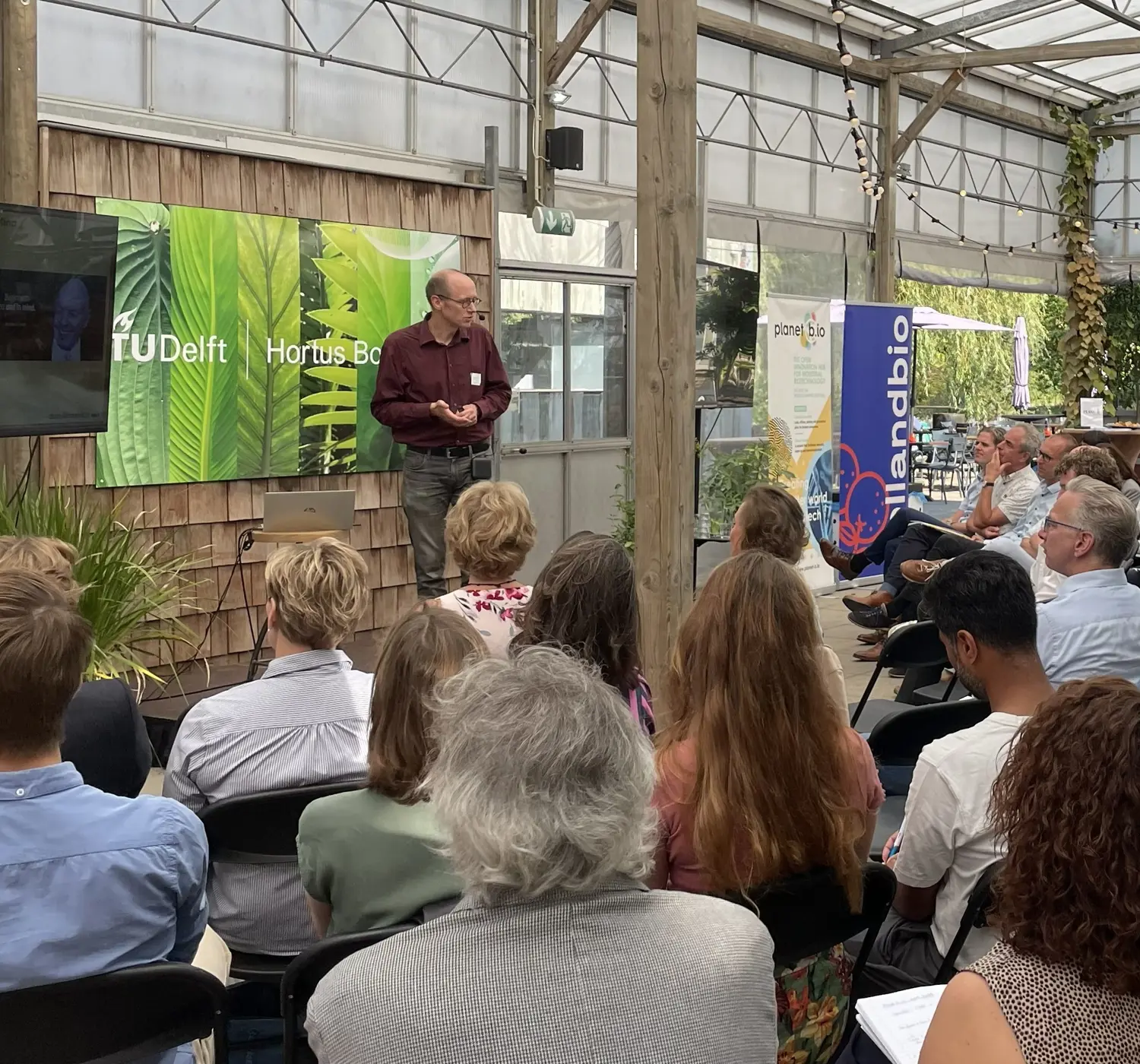28-10-2025
One year later: Insights from Scale-up frontrunners | Mickel Jansen (dsm-firmenich)

It has been one year since Planet B.io hosted the Let’s Talk Bio Scale-up event! Back then, we brought together five key scale-up frontrunners to share their insights on going from grams to tonnes and navigating the 'valley of death.'
Now, one year later, we reconnect with each of these frontrunners to learn how their organizations have progressed in the past year.
This week, we speak with Mickel Jansen, Principal Scientist BioProcess Development of dsm-firmenich, who shares last year’s improvements and reflects on scaling, innovation, and keeping the end in mind!

It’s been about a year since you gave your presentation “The Art of Scaling a BioProcess.” Looking back now, what have been the most significant changes at dsm-firmenich since then?
“Following the scale-up event, several developments have been set in motion, largely thanks to the connections that were made or strengthened there. For example, during the event I reconnected with NIZO, which led to my current advisory role in designing their future open-access scale-up infrastructure, the BFF. My focus is mainly on fermentation and the initial part of downstream processing (DSP). The project is progressing very well; I’m very pleased with the results so far. It’s a fascinating experience to be involved in the design and construction of a pilot plant and to contribute my expertise to it.
In addition, the event also rekindled our connection with PlantOne. We’ve had discussions about their pilot facility and were able to provide advice on the aspects that we consider essential for a successful pilot.”
So, the event actually brought you some extra work?
“You could say that! Although I give this advice from my position at dsm-firmenich. Speaking of work: I’ve also been approached for consultancy projects, and I really enjoy supporting start-ups where and when that’s possible. On top of that, several people have contacted me about job opportunities at dsm-firmenich.”
And on the technological front? Have there been any milestones?
“Yes, there have been some important technological advances as well. Due to the merger with Firmenich, our R&D portfolio has changed significantly over the past two years. We are now developing biotechnological routes for flavours and fragrances that were previously produced via chemical or extraction-based processes. These new processes need to be scalable and eventually brought to full production scale.
We also played a key role in the successful scale-up of Vivici’s 75 m³ fermentation runs at BBEPP, a major milestone. dsm-firmenich continues to actively support Vivici’s scale-up efforts, focusing on both fermentation and downstream processing.
Alongside existing scale-up projects, we’re also developing new technologies to make processes more efficient and sustainable. For instance, we’re experimenting with injecting pure oxygen into fermentation processes. By using higher oxygen concentrations, we can intensify processes and achieve greater yields from the same installations. At the same time, we’re exploring how far we can push the boundaries through further strain improvement.
We’re also investigating how CO₂ and energy can be converted into useful molecules, such as C1 and C2 components (methanol, formic acid, ethanol, acetic acid), which can serve as fermentation feedstocks for our products. Sustainability is becoming increasingly important: we’re studying alternative feedstocks to make our production less dependent on sugar, thereby reducing land use and aligning with our net-zero goals.
The results of these developments show that our biotechnology capabilities are strong. In the case of flavours and fragrances, we’re working with very complex molecules, yet we’re making rapid progress, which is very encouraging. At the same time, it remains essential to develop truly scalable processes and to determine the right downstream processing strategies to ensure these innovations can be scaled up effectively and efficiently.”
“By continually keeping the end result in sight and engaging in dialogue, we can ensure that concepts are scalable and can be executed efficiently in production.”
AI is booming. Is it already playing a major role in biomanufacturing?
From a manufacturing perspective, AI is still in its early stages. The technology holds great potential but is not yet widely applicable for scale-up or production. We’re already using some tools, but the greatest value at the moment lies in R&D, for instance in strain engineering. Within manufacturing, the focus is now on generating high-quality data and improving automation and data visualisation: important steps towards broader AI integration in biomanufacturing.
Is there a trend in biomanufacturing or scale-up that you wouldn’t have predicted a year ago?
“Continuing on the topic of sustainability: while dsm-firmenich has always had a strong focus on sustainability, there are now clear top-down targets in place. Different business units have been given specific targets that must be achieved by 2030. We’ve created overviews to understand our current status and to determine how many tonnes of CO₂ we need to reduce to meet the 2030 goals. Within operations, for example, we’re examining how to make better use of existing assets and reduce energy consumption. At the same time, innovation and R&D are essential for developing new technologies that will help us reach these goals.”
“Keep the end in mind” was one of your key take-home messages. Have there been times when it’s been difficult to stick to that principle?
“Oh yes, several times! The principle of “keeping the end in mind” mainly comes from an engineering mindset. Especially when you’re further removed from the factory or operational process , for example as a strain engineer, it can be difficult to maintain a clear connection with scalability and the ultimate outcome. By continually keeping the end result in sight and engaging in dialogue, we can ensure that concepts are scalable and can be executed efficiently in production.”
If you had to give one piece of non-technical advice to companies looking to scale up, what would it be?
“One often underestimated aspect is relationship management, for example, with CDMOs or pilot facilities. Strong relationships help projects run more smoothly, enable effective knowledge sharing, and allow for quicker decision-making. Don’t forget that cultural differences can also play a role. It’s also important to stay close to the pilot facilities: being present allows you to contribute directly to scale-up processes, identify problems early, and make timely adjustments. This combination of technical understanding and good relationship management is a key success factor when implementing new technologies and scaling up processes.”
If I were to interview you again a year from now, what highlight would you hope to share?
“A year from now, I hope to report that projects such as the BFF are on schedule and that the first commissioning has been successfully completed. I also expect we’ll have made concrete progress in sustainability. Perhaps we’ll already be running the first pilot projects to create prototypes for our fragrances and flavours business, marking significant progress in technology development, scale-up, and sustainable production. I’m very much looking forward to contributing to these projects!”
For more information about dsm-firmenich, please visit their website.

